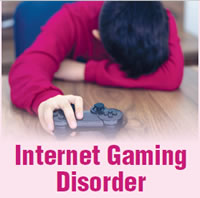It was in August 2021, in Mumbai a 16 year old left his home after spending ten lakhs rupees in a month from his mother’s card for making in-game purchases while playing PUBG online. This was not a rare incident of that. Psychologists, especially who work among children have recognized the increase within the number of children and adolescents who suffer due to internet gaming disorder especially during and after the pandemic of covid-19. Experts say that due to the habit of online classes during the pandemic, children have suffered gaming disorder. The number of cases increased then, since there were less chances of meeting friends in between other than online.
In 2018, the World Health Organization has included ‘Internet Gaming Disorder’ as a diagnosable mental health problem in the eleventh Revision of International Classifi cation of Disease (ICD-11). ICD- 11 defi nes it as “a pattern of gaming behaviour characterized by impaired control over gaming, increased priority given to gaming over other activities to the extent that gaming takes precedence over other interests and daily activities, and continuation or escalation of gaming despite the occurrence of negative consequences”.
American Psychiatric Association’s Diagnostic Statistical Manual of Mental Disorders, the latest edition (DSM-5) considered it as non-substance related addiction disorder and a subtype of internet addiction. Preoccupation with gaming, withdrawal symptoms when gaming is taken away or not possible (sadness, anxiety and irritability), the need to spend more time gaming to satisfy the urge, unsuccessful attempts to quit gaming, continuing too game despite problems, deceiving family members and others about the amount of time spent on gaming, the use of gaming to relieve negative moods such as guilt or hopelessness, risking or losing a job or a relationship due to gaming are considered as general symptoms of internet gaming disorder. However, one would be diagnosed under internet gaming disorder when one experiences fi ve or more aforementioned symptoms within a year.
Gaming presents challenges are achievable and consistent. Instant gratifi cation while completing various in-game achievements reward and create reinforced behaviour like more gaming. It would distract the individuals from more signifi cant challenges and achievements in life outside gaming.
Parents can recognize the early symptoms of gaming addicting effectively, by a sensitive monitoring the screen time of their children. An active involvement of parents by entering into a healthy dialogue with children over children’s choice of a play can educate those children in its right time. Offl ine gaming and sports could healthily replace the online ones.
– Fr.Jo Paul Kiriyanthan


